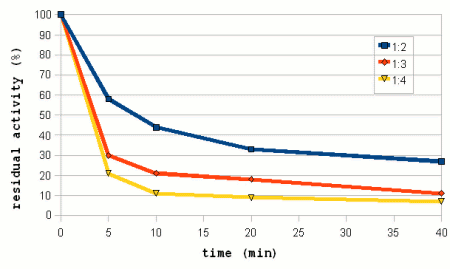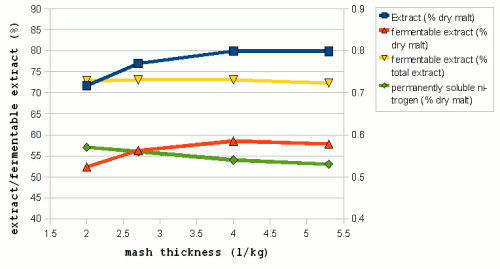OrangesOfCourse
Member
Hey guys,
I'm hoping you guys can give me some comment/critique my first BIAB. I can go ahead and list all the details and I would appreciate it if you guys could tell me where I went wrong.
I'm basing my recipe from BierMuncher's Blue Moon Clone.
Steps:
1) Started with 8 gallons strike water at 158°
2) Added grains to paint strainer bag (cover only half the kettle)
3) Mashed around 154° for 60 mins
4) Mashed-out around 168° for 10 mins.
5) Removed bag from kettle and squeezed everything we could from the bag.
6) Started boiling the wort
7) Added hops once we achieved a rolling boil and boiled for 60 mins.
8) Added coriander and orange peel at 10 and 5 mins prior to flame out.
9) Cooled the wort as low as we could in the sink (only got it down to 80°)
10) Transferred 5 gallons to a carboy and had ~1/2 gallon wort with trub.
11) Pitched yeast at 80° (Would not cool further as the house was hot)
Pre-Boil Gravity: 1.029
Post-Boil (Original Gravity): 1.033
According to BeerSmith our OG should have been 1.046 but we only achieved 1.033. Where did we go wrong?
Should we have used 2 paint strainer bags and clipped each over half the kettle and split the grains between them?
Did we not have enough water in the kettle prior to adding the grains?
What adverse effects will we get from pitching the yeast at 80°?
Please let me know if you need any more information.
I'm hoping you guys can give me some comment/critique my first BIAB. I can go ahead and list all the details and I would appreciate it if you guys could tell me where I went wrong.
I'm basing my recipe from BierMuncher's Blue Moon Clone.
Recipe Specifications
--------------------------
Boil Size: 8.19 gal
Post Boil Volume: 6.77 gal
Batch Size (fermenter): 5.50 gal
Bottling Volume: 4.75 gal
Estimated OG: 1.046 SG
Estimated Color: 3.0 SRM
Estimated IBU: 16.4 IBUs
Brewhouse Efficiency: 70.00 %
Est Mash Efficiency: 82.9 %
Boil Time: 60 Minutes
Ingredients:
------------
Amt Name
5 lbs Pale Malt (2 Row) US (2.0 SRM)
3.5 lbs Wheat, Flaked (1.6 SRM)
1.5 Wheat, Torrified (1.7 SRM)
1.00 oz Goldings, East Kent [5.00 %] - Boil 60.0
0.60 oz Coriander Seed (Boil 10.0 mins)
1.00 oz Orange Peel, Bitter (Boil 5.0 mins)
1.0 pkg Belgian Wit Ale (White Labs #WLP400)
Steps:
1) Started with 8 gallons strike water at 158°
2) Added grains to paint strainer bag (cover only half the kettle)
3) Mashed around 154° for 60 mins
4) Mashed-out around 168° for 10 mins.
5) Removed bag from kettle and squeezed everything we could from the bag.
6) Started boiling the wort
7) Added hops once we achieved a rolling boil and boiled for 60 mins.
8) Added coriander and orange peel at 10 and 5 mins prior to flame out.
9) Cooled the wort as low as we could in the sink (only got it down to 80°)
10) Transferred 5 gallons to a carboy and had ~1/2 gallon wort with trub.
11) Pitched yeast at 80° (Would not cool further as the house was hot)
Pre-Boil Gravity: 1.029
Post-Boil (Original Gravity): 1.033
According to BeerSmith our OG should have been 1.046 but we only achieved 1.033. Where did we go wrong?
Should we have used 2 paint strainer bags and clipped each over half the kettle and split the grains between them?
Did we not have enough water in the kettle prior to adding the grains?
What adverse effects will we get from pitching the yeast at 80°?
Please let me know if you need any more information.








